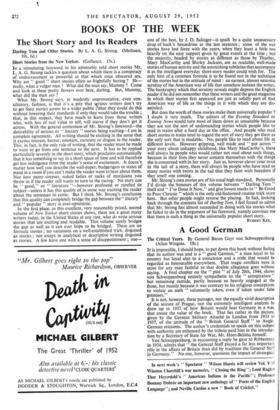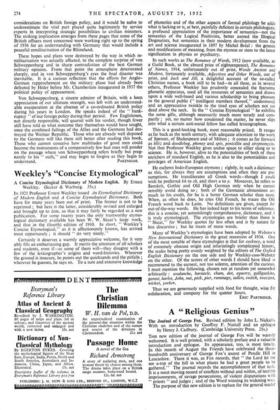A Good German
The Critical Years. By General Baron Geyr von Schweppenburg, (Allan Wingate. 18s.) IT is impossible, I should hope, to put down this book without feeling that its author was and is a " good German," a man loyal to his country but loyal also to a conscience and a code that would be regarded as honourable everywhere. That tragic conflicts were in store for any man faithful to that double allegiance goes without saying. A final chapter on the " plot " of July 20th, 1944, shows von Schweppenburg entirely sympathetic to the " conspirators but remaining outside, partly because so heavily engaged at the front, but mainly because it was contrary to his religious conceptions to violate an oath " voluntarily taken, even if taken under false premises." It is not, however, these passages, nor the equally vivid descriptioi of the seizure of Prague, nor the extremely intelligent analysis ha drew up in 1937 of how Britain would beat Germany in a war, that create the value of the book. That lies rather in the picture, given by the German Military Attaché in London from 1933 t, 1937, of the attitude of the " British General Staff " to Angle- German relations. The author's credentials to speak on this subject with authority are enhanced by the tribute paid him in the introduc- tion by a Secretary of State for War, Mr. Hore-Belisha himself. Von Schweppenburg, in recounting a reply he gave to Ribbentrcp in 1934, admits that " the General Staff played a far less important role in the affairs of Britain than did by tradition the General Steil in Germany." No one, however, questions the impact of strategical considerations on British foreign policy, and it would be naive to underestimate the vital part played quite legitimately by service experts In interpreting strategic possibilities to civilian ministers. The striking implication emerges from these pages that some of the British officers most concerned were working right up to the spring of 1936 for an understanding with Germany that would include a peaceful remilitarisation of the Rhineland.
These hopes and plans were destroyed by the way in which re- militarisation was actually affected, to the complete surprise of von Schweppenburg and in sharp contradiction of the best German military opinion. From that point the atmosphere deteriorated sharply, and in von Schweppenburg's eyes the final disaster was inevitable. It is a curious reflection that the efforts for Anglo- German rapprochement on the military plane had already been defeated by Hitler before Mr. Chamberlain inaugurated in 1937 the political policy of appeasement.
Von Schweppenburg, a sincere admirer of Britain, with a keen appreciation of our ultimate strength, was left with an understand- able exasperation at the absence of a co-ordinated British policy during his years in London. He speaks indeed of the " bank- ruptcy " of our foreign policy during that period. Few Englishmen, not directly responsible, will quarrel with his verdict, though fewer still have told us what outcome they themselves would have sought, once the combined failings of the Allies and the Germans had des- troyed the Weimar Republic. Those who are already well disposed to the Germans will like them still better after reading this book. Those who cannot conceive how multitudes of good men could become the instruments of a comparatively few bad ones will ponder on the passage where von Schweppenburg refers briefly but preg- nantly to his " oath," and may begin to forgive as they begin to



































 Previous page
Previous page